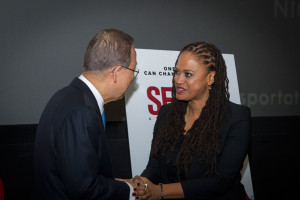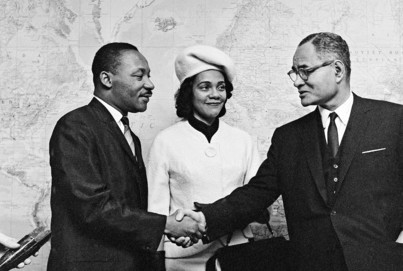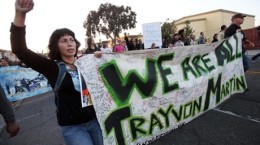Martin Luther King, Jr., would have been 86 years old today, 15 January 2015. Tragically, he was gunned down at 39 in his prime. Who was the man? He was a leader who espoused using non-violent civil disobedience based on his Christian beliefs as an American pastor to advance civil rights in the African-American Civil Rights Movement.
Last week, UN Secretary-General Ban Ki-moon met Film Director, Ava DuVernay at an advance screening of Paramount Pictures’ “Selma: One Dream Can Change the World.” The movie focuses on the epic struggle of Reverend King’s marches from Selma to Montgomery, Alabama, culminating in the 1965 Voting Rights Act signed by President Lyndon Johnson. The film depicts the trials of ordinary citizens, historical events, and the dynamics between Lyndon Johnson and Martin Luther King, Jr.
 As part of its Remember Slavery program, the event was co-organized by Paramount Pictures, the New Jersey Amistad Commission, and UN Department of Public Information (DPI.)
As part of its Remember Slavery program, the event was co-organized by Paramount Pictures, the New Jersey Amistad Commission, and UN Department of Public Information (DPI.)
Racism and prejudice continue to persist in our society today. However, films, professional athletes, art, and the media can be educational catalysts to teach young people of its dangers and divisiveness to society. (See: “An Athlete’s Plea to Society.”)
UN News Centre
The film tells the story of the American south in the early 1960s, where black citizens applying to vote were repeatedly blocked by local registrars. By 1965, there were counties in Alabama, one of the worst cases in the south, where not a single black person had voted in any election for the previous 50 years – although African Americans were guaranteed the right to vote in 1870.
These events came to a head on 7 March, 1965, when marchers, led by civil rights leader Dr. Martin Luther King Jr., were assaulted by local and state troopers. Describing her process in directing the film, Ms. DuVernay said her goal was to humanize Dr. King so the audience could connect with him.
“I think if you see [Dr.] King as a man and not a myth, not a ‘mountaintop’ speech and not all of the things that we have constructed about him, and when you see him as a man it allows his greatness to be closer to us and allows us to touch that greatness and be that great.”
New Jersey 7th grader, Celeste Hopkin, told UN Radio that watching Selma inspired her. “Dr. Martin Luther King had hope and that pushed him…and now in Ferguson they need that hope and that guidance to overcome what has happened and not to have it revealed in violence but in a different way,” Celeste added, referring to the city in the US state of Missouri, where in August 2014, unarmed African American teenager Michael Brown was shot by a white police officer.
The Selma screening was part of the UN Remember Slavery Programme, which mobilizes educators to teach about the causes and consequences of the transatlantic slave trade and to communicate the dangers of racism and prejudice.
“Selma reminds us of the issues and challenges that people of African descent have faced in the recent past and continue to face long after slavery has officially ended,” said Maher Nasser, the Acting head of DPI.
The UN General Assembly has proclaimed 2015-2024 as theInternational Decade for People of African Descent citing the need to strengthen cooperation in relation to the full enjoyment of all rights by people of African descent, and their full participation in all aspects of society.
The words and lyrics to Dion’s “Abraham, Martin, & John” echo a reminder that the good they die young, but their message of hope prevails.
UN PHOTO/Loey Felipe: UNSG Ban Ki-moon & Ava DuVernay





Pingback: viagra profesional()
Pingback: generic cialis()
Pingback: cialis from india()
Pingback: cialis online()
Pingback: Levitra or viagra()
Pingback: Real viagra without prescription()
Pingback: when will cialis be over the counter()
Pingback: generic cialis online()
Pingback: cialis cost()
Pingback: cialis coupon cvs()
Pingback: cheap cialis online()
Pingback: viagra generic()
Pingback: viagra 100mg()
Pingback: viagra 50mg()
Pingback: non prescription erection pills()
Pingback: best erection pills()
Pingback: erectile dysfunction drugs()
Pingback: canada online pharmacy()
Pingback: vardenafil dosage()
Pingback: best online casino usa()
Pingback: slot machine games()
Pingback: what is viagra()
Pingback: best online casino for money()
Pingback: online casino games()
Pingback: cash advance online()
Pingback: payday loans()
Pingback: pay day loans()
Pingback: viagra for sale()
Pingback: real gambling apps()
Pingback: casino real money()
Pingback: 20 cialis()
Pingback: where to play michigan club keno()
Pingback: online casino real money usa()
Pingback: new cialis()
Pingback: cialis internet()
Pingback: 5 mg cialis()
Pingback: cialis 5 mg()
Pingback: free slots()
Pingback: casinos online()
Pingback: real online casino()
Pingback: casino online games()
Pingback: viagra alternative()
Pingback: online pharmacy viagra()
Pingback: purchase viagra online()
Pingback: buy generic viagra()
Pingback: buy viagra uk()
Pingback: viagra alternative()
Pingback: buy cialis online cheap()
Pingback: buying generic viagra online()
Pingback: viagra 100mg pills generic()
Pingback: generic viagra for sale()
Pingback: cheapest generic viagra()
Pingback: buy cheap viagra 100mg()
Pingback: buy viagra online cheap with no prescription()
Pingback: buy bulk viagra()
Pingback: viagra no prescription()
Pingback: stores to buy viagra pills without prescription()
Pingback: Viagra 100mg united states()
Pingback: Viagra 150 mg medication()
Pingback: tadalafil from mexico()
Pingback: where to buy Viagra 25mg()
Pingback: viagra for sale()
Pingback: Viagra 100mg coupon()
Pingback: cialis generic cialis()
Pingback: Viagra 100 mg without prescription()
Pingback: Cialis 20 mg cost()
Pingback: Cialis 60mg united kingdom()
Pingback: Cialis 40 mg cheap()
Pingback: viagra()
Pingback: where to buy Cialis 10mg()
Pingback: viagra without a doctor prescription()
Pingback: cialis pills()
Pingback: Cialis 10 mg generic()
Pingback: Cialis 20mg purchase()
Pingback: viagra prices()
Pingback: Cialis 80 mg pills()
Pingback: order tadalafil 10mg()
Pingback: levitra 20mg otc()
Pingback: generic viagra cost()
Pingback: canadian viagra()
Pingback: abilify 10 mg australia()
Pingback: where can i buy actos 15 mg()
Pingback: buy aldactone 100mg()
Pingback: allopurinol 300 mg without a doctor prescription()
Pingback: amaryl 2 mg nz()
Pingback: ampicillin 250 mg otc()
Pingback: antabuse 250mg online pharmacy()
Pingback: how to purchase antivert 25mg()
Pingback: where can i buy strattera 18mg()
Pingback: aricept 5 mg pills()
Pingback: generic viagra canada customs()
Pingback: ashwagandha 60caps uk()
Pingback: levitra or cialis()
Pingback: augmentin 750/250mg canada()
Pingback: generic viagra toronto()
Pingback: baclofen 25 mg for sale()
Pingback: bactrim 800/160mg otc()
Pingback: generic cialis at walmart()
Pingback: cialis recreational use()
Pingback: how to buy Biaxin 500 mg()
Pingback: viagra coupons from pfizer()
Pingback: how to buy cialis in canada()
Pingback: calcium carbonate 500mg prices()
Pingback: cardizem cost()
Pingback: is it legal to buy viagra online()
Pingback: where can i buy casodex()
Pingback: nizagara 100 mg vs viagra()
Pingback: buy catapres 100mcg()
Pingback: ceclor without a doctor prescription()
Pingback: celebrex no prescription()
Pingback: celexa 20 mg over the counter()
Pingback: how to buy cephalexin 500 mg()
Pingback: cheap cipro()
Pingback: sildenafil coupons()
Pingback: claritin online()
Pingback: play for real online casino games()
Pingback: casinos()
Pingback: empire casino online()
Pingback: real money casino()
Pingback: real money online casinos usa()
Pingback: casino games()
Pingback: slots real money()
Pingback: online casino for real cash()
Pingback: casino online()
Pingback: online casino games real money()
Pingback: best auto and home insurance companies()
Pingback: state car insurance quotes()
Pingback: generic viagra ingredients()
Pingback: auto acceptance insurance()
Pingback: geico commercial car insurance quotes()
Pingback: car insurance cheap()
Pingback: viagra price cvs()
Pingback: cheap liability car insurance quotes()
Pingback: windhaven car insurance quotes()
Pingback: automobile insurance quotes florida()
Pingback: owners car insurance()
Pingback: 1 hour personal loans no credit check()
Pingback: online payday loans for bad credit()
Pingback: is there a generic form of viagra()
Pingback: best place for payday loans()
Pingback: installment loans in ct()
Pingback: easy quick loans()
Pingback: bad credit loan help()
Pingback: can you buy viagra online()
Pingback: payday loans loans()
Pingback: personal loans lincoln ne()
Pingback: cbd oil amazon()
Pingback: blood bruises under skin cbd oil()
Pingback: buy cbd oil with thc()
Pingback: cbd oil legal in all 50 states()
Pingback: viagra price comparison canada()
Pingback: viagra 100 mg generic()
Pingback: viagra hearing loss()
Pingback: cbd oil for diabetes()
Pingback: cbd oil for depression and anxiety()
Pingback: order viagra united states()
Pingback: how much cbd oil should i take daily()
Pingback: cbd oil wholesale()
Pingback: generic viagra in india online()
Pingback: hempworks cbd oil()
Pingback: write college essays()
Pingback: Viagra overnight shipping()
Pingback: wake county school assignments()
Pingback: viagra sildenafil buy()
Pingback: viagra tablets online australia()
Pingback: algebra homework answers()
Pingback: paper writers for hire()
Pingback: paper writer()
Pingback: essay writing service()
Pingback: viagra cream australia()
Pingback: mba essay writing service()
Pingback: uk essay writing services()
Pingback: aa seat assignment()
Pingback: essay writing service usa()
Pingback: cleocin united states()
Pingback: clomid 100mg united states()
Pingback: buy sildenafil in mexico()
Pingback: clonidine 0,1mg medication()
Pingback: Generic viagra usa()
Pingback: clozaril 50mg online pharmacy()
Pingback: cheapest colchicine 0,5 mg()
Pingback: symbicort inhaler online pharmacy()
Pingback: Generic viagra usa()
Pingback: cialis efectos secundarios()
Pingback: cheapest combivent 50/20mcg()
Pingback: where can i buy coreg 6,25 mg()
Pingback: cialis online()
Pingback: compazine 5 mg medication()
Pingback: coumadin 5mg united states()
Pingback: cozaar 25mg online pharmacy()
Pingback: buying viagra overseas()
Pingback: cheapest crestor 5 mg()
Pingback: thesis writing service reviews()
Pingback: custom essay writing reviews()
Pingback: english essay helper()
Pingback: cymbalta 20 mg without a doctor prescription()
Pingback: college admission essay writing service()
Pingback: need someone to write my paper for me()
Pingback: dapsone 1000caps coupon()
Pingback: research paper introduction help()
Pingback: thesis chapters()
Pingback: ddavp without a prescription()
Pingback: cheap depakote()
Pingback: Order viagra us()
Pingback: diamox 250mg pills()
Pingback: differin 15g usa()
Pingback: diltiazem no prescription()
Pingback: doxycycline united states()
Pingback: dramamine nz()
Pingback: cheapest elavil 50 mg()
Pingback: erythromycin 250 mg coupon()
Pingback: buy etodolac()
Pingback: flomax 0,2 mg otc()
Pingback: flonase nasal spray uk()
Pingback: top ten essay writing services()
Pingback: garcinia cambogia caps over the counter()
Pingback: cost of geodon 40mg()
Pingback: hyzaar otc()
Pingback: imdur 60mg united states()
Pingback: cialis over the counter()
Pingback: where to buy imitrex()
Pingback: imodium 2mg for sale()
Pingback: generic viagra walmart()
Pingback: generic viagra india()
Pingback: where to buy imuran 50 mg()
Pingback: indocin united kingdom()
Pingback: lamisil without prescription()
Pingback: levaquin 250mg prices()
Pingback: lopid tablet()
Pingback: cost of lopressor 25 mg()
Pingback: luvox australia()
Pingback: macrobid 50mg canada()
Pingback: meclizine 25 mg online()
Pingback: real viagra canada()
Pingback: mestinon without prescription()
Pingback: best price prescription drugs()
Pingback: micardis online pharmacy()
Pingback: canadian pharmacy online()
Pingback: mobic medication()
Pingback: motrin generic()
Pingback: best non prescription online pharmacies()
Pingback: where to buy nortriptyline()
Pingback: order periactin 4mg()
Pingback: pfeiffer viagra on line()
Pingback: phenergan 25mg usa()
Pingback: where can i buy plaquenil()
Pingback: prevacid 15mg tablets()
Pingback: prilosec 20 mg prices()
Pingback: proair inhaler 100 mcg united kingdom()
Pingback: procardia 30mg united states()
Pingback: proscar online()
Pingback: protonix purchase()
Pingback: provigil no prescription()
Pingback: pulmicort 100 mcg otc()
Pingback: viagra natural alternative()
Pingback: pyridium 200 mg price()
Pingback: reglan cheap()
Pingback: remeron 15mg tablets()
Pingback: order retin-a cream 0.05%()
Pingback: revatio 20mg australia()
Pingback: risperdal 2mg purchase()
Pingback: robaxin medication()
Pingback: rogaine coupon()
Pingback: seroquel generic()
Pingback: singulair 4 mg without prescription()
Pingback: skelaxin 400mg united states()
Pingback: spiriva 9mcg cost()
Pingback: cost of tenormin 25 mg()
Pingback: thorazine 100 mg cost()
Pingback: how to buy toprol 50mg()
Pingback: how to buy tricor 160mg()
Pingback: valtrex 1000mg united states()
Pingback: vantin online pharmacy()
Pingback: verapamil price()
Pingback: voltaren generic()
Pingback: buy wellbutrin 300 mg()
Pingback: where can i buy zanaflex 2 mg()
Pingback: where can i buy cialis online in canada()
Pingback: view it()
Pingback: where can i buy zocor()
Pingback: zovirax 400mg without a prescription()
Pingback: cheapest zyloprim()
Pingback: zyprexa no prescription()
Pingback: silk road viagra()
Pingback: zyvox 600 mg for sale()
Pingback: sildenafil online()
Pingback: tadalafil coupon()
Pingback: furosemide 100mg without a prescription()
Pingback: cheap escitalopram 20mg()
Pingback: aripiprazole 10 mg medication()
Pingback: pioglitazone over the counter()
Pingback: how to buy spironolactone 100 mg()
Pingback: where can i buy fexofenadine()
Pingback: glimepiride 4mg canada()
Pingback: meclizine otc()
Pingback: leflunomide pharmacy()
Pingback: atomoxetine cheap()
Pingback: donepezil price()
Pingback: anastrozole 1mg cost()
Pingback: irbesartan tablet()
Pingback: dutasteride cost()
Pingback: olmesartan 40 mg online()
Pingback: buspirone 5 mg nz()
Pingback: clonidine canada()
Pingback: celecoxib no prescription()
Pingback: cialis viagra levitra samples()
Pingback: citalopram for sale()
Pingback: cheap cephalexin 500mg()
Pingback: cialis with dapoxetine review()
Pingback: buy ciprofloxacin 1000 mg()
Pingback: buy cialis online with paypal()
Pingback: order clindamycin 300mg()
Pingback: how to buy clozapine 50 mg()
Pingback: prochlorperazine tablet()
Pingback: what's better than viagra()
Pingback: cialis no prescription arizona()
Pingback: carvedilol 12.5 mg prices()
Pingback: cost of warfarin()
Pingback: how to purchase rosuvastatin 10 mg()
Pingback: divalproex cost()
Pingback: trazodone 50 mg pills()
Pingback: acetazolamide 250 mg prices()
Pingback: black cialis sale()
Pingback: cost of fluconazole 100mg()
Pingback: phenytoin united kingdom()
Pingback: where can i buy oxybutynin 2.5mg()
Pingback: cheapest doxycycline()
Pingback: bisacodyl cheap()
Pingback: how to purchase venlafaxine 37.5 mg()
Pingback: best place to buy viagra over the counter in usa()
Pingback: amitriptyline cheap()
Pingback: permethrin pharmacy()
Pingback: erythromycin online pharmacy()
Pingback: buy generic viagra and cialis online()
Pingback: tlgncanl()
Pingback: estradiol purchase()
Pingback: etodolac 200mg usa()
Pingback: tamsulosin 0.2 mg usa()
Pingback: alendronate 70 mg purchase()
Pingback: where to buy real viagra()
Pingback: nitrofurantoin for sale()
Pingback: sildenafil waar kopen()
Pingback: how soon can you take second dose ivermectin()
Pingback: glipizide 5 mg purchase()
Pingback: viagra otc us()
Pingback: isosorbide for sale()
Pingback: sumatriptan 100mg canada()
Pingback: loperamide 2mg coupon()
Pingback: cialis()
Pingback: azathioprine canada()
Pingback: indomethacin australia()
Pingback: viagra jacket()
Pingback: lamotrigine 200mg cost()
Pingback: cost of terbinafine 250mg()
Pingback: levothyroxine mcg price()
Pingback: can i buy amoxil over the counter()
Pingback: 200 mg lasix()
Pingback: azithromycin 500g()
Pingback: ivermectin 2mg()
Pingback: how to get ventolin over the counter()
Pingback: gemfibrozil 300 mg nz()
Pingback: cheapest clotrimazole 10g()
Pingback: uses of doxycycline()
Pingback: uses for prednisolone()
Pingback: clomid for women()
Pingback: dapoxetine h()
Pingback: diflucan and warfarin()
Pingback: metoclopramide 10 mg price()
Pingback: maker of synthroid()
Pingback: essayhelp()
Pingback: help me write a thesis statement()
Pingback: how to write thesis()
Pingback: best essay writer company()
Pingback: hims propecia()
Pingback: best website to get essays()
Pingback: buy cialis online()
Pingback: neurontin narcotic()
Pingback: metformin effects()
Pingback: substitutes for paxil()
Pingback: plaquenil and arava()
Pingback: top rated online canadian pharmacies()
Pingback: price of lasix 80 mg()
Pingback: levitra or cialis which is better()
Pingback: first time use viagra()
Pingback: best conversation starters on tinder()
Pingback: how do i get viagra()
Pingback: cheap genieric cialis()
Pingback: cialis commercial 2016()
Pingback: free live pharmacy tech ce online()
Pingback: cvs online pharmacy login()
Pingback: fastest delivery of cialis()
Pingback: priligy medication()
Pingback: cost of ventolin albuterol inhaler()
Pingback: hydroxychloroquine antiviral mechanism()
Pingback: hydroxychloroquine tablets buy online()
Pingback: hydroxychloroquine works for covid()
Pingback: hydroxychloroquine malarial treatment for humans()
Pingback: cnn hydroxychloroquine()
Pingback: pharmacy tech in canada()
Pingback: pharmacy tech online training()
Pingback: https://regcialist.com/()
Pingback: does viagra make you last longer in bed()
Pingback: ivermectil tablets ip 6 mg()
Pingback: dapoxetine pills usa()
Pingback: what are the side effects of amlodipine besylate()
Pingback: can you crush atorvastatin()
Pingback: generic prozac()
Pingback: how much seroquel to sleep()
Pingback: 875 875 ivermectin ivermectin mg mg()
Pingback: celexa and lexapro()
Pingback: viagra online usa()
Pingback: duloxetine colors()
Pingback: canadian pharmacy generic viagra()
Pingback: viagra without a doctor prescription()
Pingback: zoloft and headaches()
Pingback: womens viagra()
Pingback: viagra pills()
Pingback: brand cialis()
Pingback: rx escitalopram()
Pingback: cialis tadalafil 10mg tablets()
Pingback: buycheapviagra.net()
Pingback: cialis online()
Pingback: hydroxychloroquine antimalaria()
Pingback: discount cialis online()
Pingback: cialis 5 mg()
Pingback: buy cialis overnight()
Pingback: stromectol tablets 12 mg()
Pingback: sildenafil 50 mg()
Pingback: buy now viagra cialis()
Pingback: cymbalta alternative()
Pingback: stromectol for chickens()
Pingback: female viagra()
Pingback: cheap indian cialis()
Pingback: cialis pills for sale()
Pingback: prednisone and alcohol()
Pingback: purchase viagra()
Pingback: viagra 200mg tablets()
Pingback: sildenafil 50mg united states()
Pingback: amoxicillin 500 for uti()
Pingback: buy tadalafil()
Pingback: sildenafil 20 mg()
Pingback: purchase finasteride propecia()
Pingback: viagra online canadian pharmacy()
Pingback: buy cialis uk()
Pingback: deltasone online()
Pingback: discount viagra()
Pingback: use of treat parasite infestations()
Pingback: sildenafil 100 mg best price()
Pingback: ivermectin scabies dosage for humans()
Pingback: viagra online over the counter()
Pingback: generic cialis online without prescription()
Pingback: buy generic viagra online india()
Pingback: ivermectin for swine oral()
Pingback: ivermectin shampoo for guinea pigs()
Pingback: how can i get cialis()
Pingback: zithramax tripack()
Pingback: average cost of generic viagra()
Pingback: order ventolin online canada()
Pingback: annual cost of viagra medicare()
Pingback: its my first time to take a viagra pill()
Pingback: how much does generic viagra cost in canada aarp()
Pingback: cialis canada()
Pingback: cialis after surgery()
Pingback: cialis coupons()
Pingback: zithromax for children()
Pingback: buy viagra montreal()
Pingback: how much for viagra()
Pingback: sildenafil walmart()
Pingback: sildenafil()
Pingback: lisinopril and trying to conceive()
Pingback: best generic viagra()
Pingback: dapoxetine wo kaufen sie()
Pingback: over the counter meds similar to a zpack()
Pingback: viagra connect()
Pingback: z pack otc()
Pingback: viagra for women()
Pingback: real viagra without doctor prescription()
Pingback: viagra receptfritt()
Pingback: viagra danger myths()
Pingback: cost for viagra()
Pingback: amoxil generic()
Pingback: sildenafilo()
Pingback: lasix 10 mg pill()
Pingback: rx gabapentin()
Pingback: plaquenil buy()
Pingback: prednisone pill cost()
Pingback: viagra cialis()
Pingback: priligy 30 mg usa()
Pingback: modafinil in the us()
Pingback: ivermectin lotion 0.5()
Pingback: combivent hfa()
Pingback: zithromax online()
Pingback: viagra price()
Pingback: cost of viagra per pill()
Pingback: 5mg prednisone()
Pingback: how to buy modafinil()
Pingback: otc male viagra pill()
Pingback: ventolin()
Pingback: citrato de sildenafila()
Pingback: viagra cock()
Pingback: viagra otc()
Pingback: sildenafil prices()
Pingback: the dirtiest sex games ever played on pc()
Pingback: viagra alternatives()
Pingback: u.s.a online casino()
Pingback: borgata online casino()
Pingback: buy viagra()
Pingback: hollywood casino online()
Pingback: casino in gta 5 online()
Pingback: lincoln online casino()
Pingback: free online casino real money()
Pingback: online pa casino()
Pingback: vegas 777 online casino()
Pingback: dairy free keto()
Pingback: why am i not losing weight on keto()
Pingback: chaffle recipe keto()
Pingback: writing analytical essay()
Pingback: walgreens viagra()
Pingback: paid essay writing()
Pingback: over the counter stromectol cvs()
Pingback: write a essay about yourself()
Pingback: writing essay conclusion()
Pingback: essay writing helper()
Pingback: a real true gay dating()
Pingback: dscreet gay dating()
Pingback: gay internet dating sites()
Pingback: 100mg white viagra s100()
Pingback: what is an example of critical thinking()
Pingback: how to build critical thinking skills()
Pingback: critical thinking assignments()
Pingback: how to write an essay introduction()
Pingback: argumentative essay counterclaim()
Pingback: apa essay format example()
Pingback: essay hook examples()
Pingback: college essay writing service()
Pingback: essay editor()
Pingback: short essay format()
Pingback: essay editor free()
Pingback: essay cover page example()
Pingback: 2premises()
Pingback: gay dating kingston ny()
Pingback: gay dating baton rouge()
Pingback: gay dating upstate new youk()
Pingback: woman 'why can't i stop dating gay men?' 2018()
Pingback: knoxville gay dating()
Pingback: online casino bonus cash()
Pingback: prices for sildenafil 50 pills()
Pingback: free gay chat rooms no registration needed()
Pingback: british gay men dating american gay men()
Pingback: dubuque gay guys chat()
Pingback: lilly cialis coupons()
Pingback: gay chat city()
Pingback: walgreens cialis prices()
Pingback: naked gay dating()
Pingback: male viagra tablet()
Pingback: generic cialis no prescription australia()
Pingback: best liquid tadalafil()
Pingback: viagra covid()
Pingback: ivermectin cost in usa()
Pingback: flccc ivermectin()
Pingback: salamol inhaler()
Pingback: pussy slots teen()
Pingback: clomid clomiphene()
Pingback: free jungle monkey slots()
Pingback: free video slots()
Pingback: cost of molnupiravir()
Pingback: eso quick slots youtube()
Pingback: latisse cost()
Pingback: otc tizanidine()
Pingback: baricitinib 2 mg()
Pingback: aralen buy()
Pingback: buy chloroquine()
Pingback: willy wonka slots()
Pingback: black pawkeet slots guide()
Pingback: bowser slots mario party 2()
Pingback: goldfish casino slots free()
Pingback: casino video slots winner,()
Pingback: pussy slots teen()
Pingback: generic cialis drugs()
Pingback: ivermectin nz()
Pingback: ivermectin ireland()
Pingback: tadalafil indian brands()
Pingback: purchase viagra pills()
Pingback: what is ivermectin used for humans()
Pingback: price for generic cialis()
Pingback: online dissertation help professional()
Pingback: online law dissertation help()
Pingback: cialis cost()
Pingback: cialis genérico()
Pingback: sildenafil pills prescription()
Pingback: dissertation writing help ann arbor()
Pingback: daily generic cialis()
Pingback: apa dissertation format()
Pingback: get dissertation help()
Pingback: buy stromectol()
Pingback: how to buy sildenafil tablets()
Pingback: cialis price walmart()
Pingback: purchase cialis online()
Pingback: buy cialis canada()
Pingback: order prednisone online()
Pingback: does prednisone 20mg pill look like()
Pingback: buy tadalafil no prescription()
Pingback: coronavirus antiviral()
Pingback: generic cialis online prescription()
Pingback: goodrx cialis()
Pingback: cialis genérico()
Pingback: ivermectin overdose()
Pingback: generic viagra soft pills()
Pingback: cialis coupon()
Pingback: best online casino real money()
Pingback: cialis generic()
Pingback: ivermectin malaria()
Pingback: cost of stromectol()
Pingback: biggest no deposit welcome bonus()
Pingback: ivermectin tablets over counter()
Pingback: cialis without a doctor prescription()
Pingback: viagra sans ordonnance au quebec()
Pingback: what is cialis()
Pingback: cost of ivermectin()
Pingback: cialis online prescription uk()
Pingback: generic tadalafil 20mg()
Pingback: ivermectin 1 cream generic()
Pingback: buy ivermectin 3 mg()
Pingback: where can i buy cialis online without a prescription()
Pingback: where to buy ivermectine us()
Pingback: ivermectin cost in usa()
Pingback: ivermectin cost australia()
Pingback: ivermectin price us()
Pingback: ivermectin 6mg tablets()
Pingback: buy ivermectin for humans uk()
Pingback: ivermectin for gapeworm()
Pingback: furosemide uk buy()
Pingback: ivermectin 0.08 oral solution()
Pingback: ivermectin pills canada()
Pingback: lasix 3170()
Pingback: stromectol drug()
Pingback: avis tadalafil()
Pingback: medicament ivermectin()
Pingback: ivermectin for sale()
Pingback: ivermectin tablet 1mg()
Pingback: buy ivermectin uk()
Pingback: lucky land casino()
Pingback: discount cialis()
Pingback: ivermectin 0.5 lotion()
Pingback: ivermectin cost australia()
Pingback: joe rogan ivermectin()
Pingback: ivermectin uses()
Pingback: cialis free walmart coupons()
Pingback: stromectol coronavirus()
Pingback: where can i purchase ivermectin()
Pingback: cialis over the counter()
Pingback: generic for ivermectin()
Pingback: hydroxychloroquine()
Pingback: Is a 3 day period normal levitra buy?()
Pingback: How many minutes is 10000 steps buy levitra at walmart?()
Pingback: What are the 3 types of twins vardenafil online?()
Pingback: Medications and Hormonal Balance - Navigating Transitions, Promoting Well-being ventolin without dr prescription?()
Pingback: Medications and Gastrointestinal Disorders - Finding Digestive Relief how to dose stromectol?()
Pingback: Medications and Respiratory Wellness - Breathing Freely, Living Fully stromectol for head lice?()
Pingback: Medications and Mental Health - Breakthroughs in Treatment and Care Cenforcec?()
Pingback: Do breakups last forever Cenforce 100mg price?()
Pingback: What decides baby boy or girl buy Cenforce 50mg pills?()
Pingback: Is love a need or a want Cenforce 50mg price?()
Pingback: What happens if you stop ejaculating buy Cenforce 50mg without prescription?()
Pingback: The Impact of Generic Medications on Healthcare Costs buy ivermectin online?()
Pingback: Medications - Revolutionizing Diabetes Management Cenforce 25?()
Pingback: How are high-risk pregnancies managed to ensure the well-being of mothers and babies plaquenil 200 mg walgreens?()
Pingback: Medications and Stress Relief - Unwinding the Knots of Modern Life is vidalista safe?()
Pingback: Medications and Precision Medicine - Tailoring Treatments to Individuals Cenforce 200 sildenafil citrate?()
Pingback: Medications - A Holistic Approach to Pain Management symbicort inhaler for asthma 160/4.5?()
Pingback: Parkinson's Disease - Insights into Diagnosis and Treatment fake viagra pills?()
Pingback: Can a man live with ED viagra over the counter walgreens?()
Pingback: Can antibiotics cause weight gain stromectol 3mg?()
Pingback: Why does a man get erect while sleeping levitra walgreens?()
Pingback: What antibiotics make you tired ivermectin pills()
Pingback: Is men's health membership worth it vidalista 60 side effects()
Pingback: What helps asthma go away ventolin inhaler for asthma()
Pingback: What are the effects of chronic obesity on erectile function in young men vidalista 20 mg price()
Pingback: black viagra pill()
Pingback: How do I know if I need Viagra??()
Pingback: How can you tell if a man is mature??()
Pingback: priligy for sale - What is Crosby theory?()
Pingback: furosemide 40mg pill()
Pingback: can you buy dapoxetine over the counter()
Pingback: androgel coupon()
Pingback: breathing spray ventolin 100()
Pingback: androgel testosterone gel()
Pingback: kamagra usa()
Pingback: cialis strength()
Pingback: vilitra 20mg()
Pingback: digihaler()
Pingback: buy vilitra()
Pingback: How long after eating is your stomach empty for medication hydroxychloroquine sulfate?()
Pingback: Anonymous()
Pingback: can you buy priligy()
Pingback: kamagra jelly pack()
Pingback: vidalista 60mg uk()
Pingback: fildena uk()
Pingback: clomid for men()
Pingback: buy lasix 40 mg()
Pingback: levitra women()
Pingback: kamagra gel()
Pingback: metronidazole flagyl 250 mg tablet()
Pingback: clomid over the counter()
Pingback: vidalista 40 mg reviews()
Pingback: cenforce 200()
Pingback: order Cenforce 100mg for sale()
Pingback: buy fildena 50mg online cheap()
Pingback: fildena 100mg()
Pingback: Cenforce 200 sildenafil citrate()
Pingback: vidalista kopen()
Pingback: Generic clomid without a prescription()
Pingback: clomid and testosterone()
Pingback: rx clomid()
Pingback: vidalista()
Pingback: Generic clomid tablets()
Pingback: clomid()
Pingback: Generic clomid without a prescription()
Pingback: clomid for sale()
Pingback: poxet 90 mg dapoxetine()
Pingback: priligy de 30 o 60 mg()
Pingback: kamagra 100mg oral jelly()
Pingback: vidalista 60()
Pingback: vidalista black()
Pingback: vidalista 5mg()
Pingback: wixela generic()
Pingback: advair medicine()
Pingback: advair inhaler()
Pingback: Cenforce()
Pingback: Cenforce()
Pingback: Sildenafil Citrate Tablets 100 mg()
Pingback: stromectol 3mg information()
Pingback: cenforce of viagra()
Pingback: Cenforce 150 side effects()
Pingback: lasix 100mg brand()
Pingback: buy Cenforce online cheap()
Pingback: fildena vs sildenafil()
Pingback: vidalista 80mg()
Pingback: hydroxychloroquine buy()
Pingback: advair inhaler price()
Pingback: loniten for hair loss()
Pingback: cenforce()
Pingback: Cenforce 200 amazon()
Pingback: fildena 100 side effects()
Pingback: proscar in women()
Pingback: kamagra 50mg()
Pingback: buy cenforce 100mg online()
Pingback: kamagra pharmacy indonesia()
Pingback: fildena super active kaufen()
Pingback: durvet duramectin equine wormer paste 12 tubes()